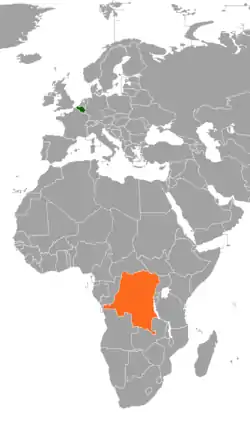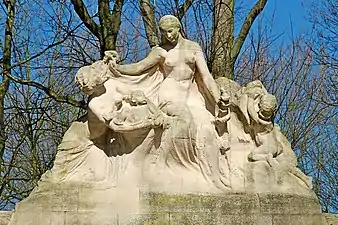Belgium–Democratic Republic of the Congo relations
Belgium–Congo relations refers to relations between the Kingdom of Belgium and the Democratic Republic of the Congo. The relationship started with the exploration of the Congo river by Henry Morton Stanley.
 | |
Belgium |
DR Congo |
|---|---|
Belgium has an embassy in Kinshasa and a consulate-general in Lubumbashi. The DR Congo has an embassy in Brussels and a consulate-general in Antwerp. Both nations are members of the Organisation internationale de la Francophonie and the United Nations.
History
Following Stanley's expedition to the Congo, King Leopold II initially ruled Congo as his personal property following the Berlin Conference.[1][2] On 18 October 1908, the Belgian parliament voted to annex the Congo Free State;[3] on 15 November 1908, Leopold formally relinquished personal control over the state to Belgium, forming the Belgian Congo. During the Free State period, Congo was reputed to have been brutalised by a harsh economic policy that entailed rubber production quotas to be met by forced labour.[2] Other crops were also farmed in the Congo.[4]
Political ties
After fifty years of Congo's independence, a visit by the Belgian King Albert II was met with controversy as the king's brother, Baudouin, was said to have been connected to the assassination of Patrice Lumumba, and Lumumba's family sought to bring a case against 12 Belgians claiming Lumumba's torture and murder constituted war crimes.[5]
Amidst other controversies, Congo's Minister of Communication, Lambert Mende Omalanga, described an "unacceptable attitude of the Belgian political class to consider the Congolese problems as internal affairs of their country," following such allegations as the "very bizarre case of a purely imaginary invitation of Belgian soldiers to participate in the military parade in Kinshasa," amongst others. He then said "coloniser to colonised relations is over." The Belgian Minister for Development Cooperation, Charles Michel, then expressed surprise at the remarks and demanded respect for Belgium.[6]
During a visit by a Belgian cabinet delegation in 2008 to the Congo, President Joseph Kabila said he did not appreciate a message brought by the team in regards to human rights issues. Kabila said: "Belgium must make a choice on the type of relationship it wants to have with the Democratic Republic of Congo. It has a choice between having good relations as partners in a mature relationship with a sovereign and independent state or a master-slave relationship. I will note that every time a Belgian delegation is led by the minister of foreign affairs; it is with a lot of arrogance, as if our visitors are coming here to lecture us. This is unacceptable. The Congo will never accept this, definitely not me."[7]
In December 2016, when President Kabila announced the postponement of elections and that he would not be stepping down despite the end of his constitutional mandate, the Belgian government announced that it would "re-examine" its relations with the DRC.[8] The Belgian government also advised its citizens to not visit the DRC due to the political unrest.[9] In April 2017 it was announced that the Congolese government informed the Belgian military attaché in Kinshasa that DR Congo would suspend military cooperation with Belgium, after foreign minister Didier Reynders criticized President Kabila's choice of the new Prime Minister, Bruno Tshibala.[10]
On 30 June 2020, King Philippe of Belgium expressed his "deep regrets", but not apologies, for the atrocities in the Congo Free State in a letter to the Congolese president.[11]
Requests for decolonization of the public space
.jpg.webp)
There are many monuments in Belgium glorifying the Belgian colonial past. Most of them date from the inter-war period, at the height of patriotic propaganda.[12]
There have been several proposals to remove the statues from the public space. These demands for the decolonisation of the public space appear in Belgium as early as 2004 in Ostend, where the hand of one of the 'grateful Congolese' represented on the Leopold II monument is sawn off to denounce the king's exactions in the Congo, and as early as 2008 in Brussels, where an activist named Théophile de Giraud covers the equestrian statue of Leopold II with red paint.[13]
These actions intensified during the years 2010 with the emergence of collectives[14][15] and the publication of carte blanche[16][17] and finally the affair of the bust of "General Storms".[18]
On 4 June 2020, the majority parties in the Brussels-Capital Region tabled a resolution aimed at decolonising the public space in the Brussels region[19][20] and then began a wave of kidnappings and degradations of statues, such as the statues of Leopold II at the University of Mons,[21] Ekeren,[22] Brussels[23] · ,[24][25][26] Auderghem,[27][28] Ixelles[29] and Arlon,[30] or the bust of King Baudouin in front of the cathedral of Saints Michel and Gudule in Brussels.[31][32]
- Persistence of colonial monuments in the public space

Frieze « Belgians in Congo »
(Monument to the Belgian pioneers in Congo, Cinquantenaire, Brussels).
« The black race welcomed by Belgium »
(Monument to the Belgian pioneers in Congo, Cinquantenaire, Brussels).
« The Belgian Genius guiding the Congo »
(Monument General Thys, Cinquantenaire, Brussels).
References
- Hochschild.
- Stengers, Jean, "Le rôle de la commission d'enquête de 1904-1905 au Congo", In Congo: Mythes et réalités, Bruxelles: Editions Racine, 2005, pp. 159-179.
- Senelle, R. and E. Clément (2009), Léopold II et la Charte Coloniale, Brussels: Editions Mols.
- Boahen, A. Adu (1990). Africa Under Colonial Domination, 1880–1935. p. 171.
- "Charges sought in Lumumba death 50 years after DRC independence | Radio Netherlands Worldwide". Archived from the original on 2013-10-05. Retrieved 2010-11-30.
- Congo/Belgium: The coloniser to colonised relationship is over
- Tense relations between the DRC and Belgium | Congo Planet
- Williams, Richard (20 December 2016). Belgium says it will 're-examine' relations with Democratic Republic of Congo after Kabila fails to step down. The Independent. Retrieved 14 September 2017.
- Belgium urges citizens out of Congo on fears of violence. Reuters. Published 16 December 2016. Retrieved 15 September 2017.
- DRC suspends military cooperation with Belgium. News24. Published 15 April 2017. Retrieved 15 September 2017.
- Belgian King Philippe expresses profound regrets for brutal colonial rule (The Guardian). Published 30 June 2020.]
- Yolan Devriendt (2018). "Belgische koloniale geschiedenis in het katholiek middelbaar onderwijs: vergeten verhaal of kritisch discours?" (PDF). p. 13.
- Site Gloup Gloup !
- G., N. (17 December 2015). "La statue de Léopold II vandalisée". www.lalibre.be. Retrieved 2016-10-22.
- Nordine Saïdi (2016-01-06). "Il n'y a pas d'hommage à rendre à un roi génocidaire". Retrieved 2016-10-22.
- Collectif de signataires (15 June 2016). "Comment décoloniser la statue de Léopold II?". lesoir.be. Retrieved 2016-10-22.
- Mireille-Tsheusi Robert (2 November 2018). "Décoloniser l'espace public pour lutter contre le racisme". Le Soir.
- "Accord de principe pour déplacer la statue du " Général Storms " vers l'Africa Museum". RTBF. 28 May 2020.
- S.E.M. (4 June 2020). "Décolonisation de l'espace public : pour les partis de la majorité, l'heure est au changement". DH.
- Kalvin Soiresse (4 June 2020). "Décolonisation de l'espace public : pour les partis de la majorité bruxelloise, l'heure n'est plus à l'attente, mais au changement". Ecolo.
- La Ligue de l’Enseignement et de l’Education permanente asbl (10 June 2020). "Décolonisation de l'espace public". La Ligue de l’Enseignement et de l’Education permanente asbl.
- "Une statue de Léopold II retirée à Anvers afin d'être restaurée après dégradation". RTBF. 9 June 2020.
- Théo Anberrée (10 June 2020). "Bruxelles: la statue équestre du Roi Léopold II à Trône vandalisée". Le Soir.
- M.L. (10 June 2020). "La statue de Léopold II de la place du Trône vandalisée". DH.
- Camille Berkenbaum (10 June 2020). "Les militants antiracistes s'en prennent aux statues de Léopold II". L'Echo.
- "Bruxelles: la statue de Léopold II située sur la place du Trône a été vandalisée". RTBF. 10 June 2020.
- "Une statue de Léopold II déboulonnée cette nuit à Auderghem". RTBF. 12 June 2020.
- "Plusieurs dégradations au nom de la décolonisation de l'espace public". L'Avenir. 12 June 2020.
- "Deux nouvelles attaques contre des statues à Ixelles". La Province. 15 June 2020.
- J.-J.G. (29 June 2020). "À Arlon, la statue de Léopold II a été taguée et très vite nettoyée". L'Avenir.
- Am.C. (12 June 2020). "Bruxelles : un buste du roi Baudouin recouvert de peinture rouge". RTBF.
- Rédaction de la Libre (12 June 2020). "Une statue du roi Baudouin également vandalisée à Bruxelles". La Libre.
